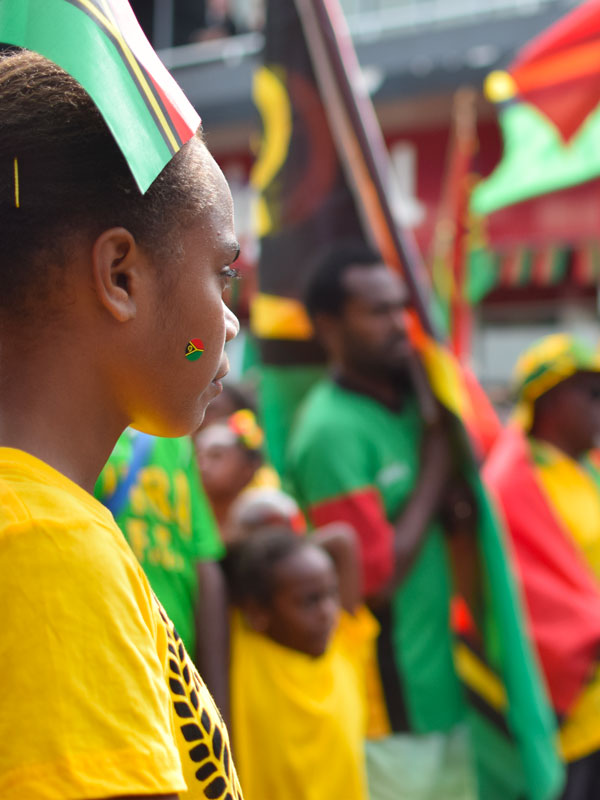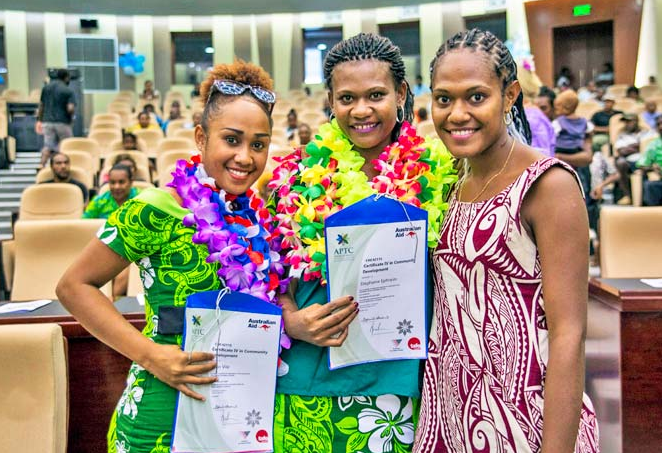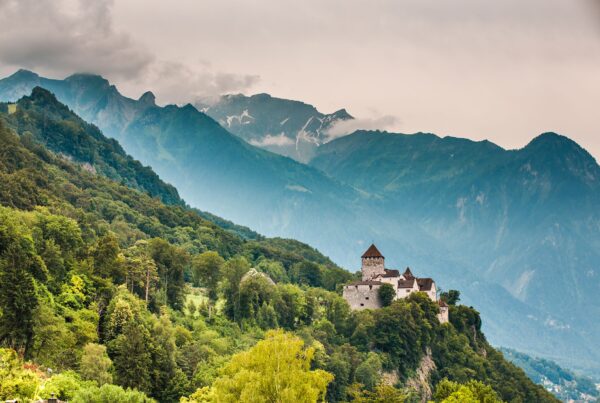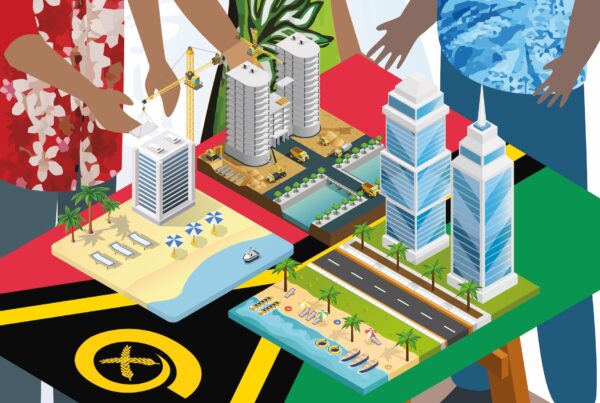Knowledge industries are high value, low-capital, and environmentally friendly. They’re also Vanuatu’s most promising means of achieving the economic self-reliance of a truly independent nation. But since they require a highly educated workforce, we’ll either have to grow our own or import human capital from abroad.
The independent Republic of Vanuatu just turned 40, and it’s time we levelled with ourselves: how truly independent are we?
Due to our location, geography, climate and dearth of natural resources, what little our economy manages to export every year is dwarfed by the strategic imports we need to survive.
This is the hand we’ve been dealt and, as a result, we’ve been forced to rely on aid money from the international community. Ever since the colonial powers pulled up anchor, we’ve been at least to some extent dependent on the largesse of others. This has always left our leaders exposed to geopolitical pressure, flagrant or otherwise, when it comes to enacting legislation, for instance.
Until now, we haven’t been able to invest that foreign aid in ways that could reduce our dependence on it. Despite the flow of aid coming into the country year after year, we’re still performing poorly, as evidenced by our sluggish growth (2.7% for 2017-2018) and stagnating per capita income (a little over 3,000 USD in 2019). And that was before the coronavirus hit.
By any objective measure, it seems we simply cannot build a stronger, more self-reliant economy despite all the money we throw at it. A culture of foreign aid dependence may very well have contributed to this inertia.
Perhaps we’re developing the wrong economy?

The world has changed in 40 years. A large part of global economic growth no longer comes from muscles and machines as it did in the last century. Service industries such as software design, financial services, information and communications, marketing and support are some of the best-performing sectors in today’s world. They form what’s loosely termed the knowledge economy. It’s been a rapid transition with much disruption. When it comes to developing a truly independent Vanuatu, perhaps it’s just the kind of disruption we’ve been waiting for.
From the perspective of a small island nation, the main benefit of the knowledge economy is that it’s free of physical limitations. While a traditional economy is constrained by the amount of, say, arable land or fish stocks it possesses, many knowledge industries are only limited by the number of productive minds contributing to them. For Vanuatu, knowledge is the key to the economic liberation that is the true hallmark of an independent state.
It’s time
Our economic history of the last 40 years shows us that Vanuatu has a better shot at grabbing a slice of the global economic pie using brain power rather than the traditional, physically-limited sectors it has struggled to develop. During that time, regular injections of foreign aid have amounted to nothing more than life support. Now that our economy has been plunged into pandemic-driven recession, we are painfully aware that we cannot rely on a steady stream of tourists to save the day. This moment, perhaps more than any other in our history, is the time to remodel our economic growth plans around the knowledge economy.
Besides improving our trade balance, embracing industries of the future will have a positive impact on every resident’s well-being. Where the traditional physical economy requires lots of natural resources, arable land and fossil fuels, the knowledge economy runs almost solely on an educated labour force with reliable access to the Internet.
And because populations with these advanced skillsets are still relatively rare and unevenly distributed, employers can’t just pull up stakes and relocate to another country in search of lower labour costs, as frequently occurs in the manufacturing sector. Every gain in GDP produced by knowledge workers is ours for the keeping.
Education is liberation
Education is hugely important for every country as it results in a better-informed citizenry that becomes the very foundation of a resilient society. For Vanuatu its dividends would be even greater, as it can be the golden path to the kind of economic self-reliance that supports true, no-strings-attached independence.
While COVID-19 hit the island nation hard in most every other respect, it resulted in a positive paradigm shift in education. Online education makes learning easier and more effective, yet ensuring remote areas have access to high-speed Internet only adds to the government’s financial burden.
Given our current challenges, the road to true independence will be long and arduous. The Republic currently lags behind its regional and global peers by most metrics. Ni-Vanuatu receive 6.8 years of schooling on average; only 5% of us go beyond secondary education, while three times more (17%) have no formal education at all.

Our current supply of fresh post-secondary graduates meets just a fraction of market demand. Shortage of highly skilled employees, mostly managers, professionals and technicians, is evident in both public and private sectors in Vanuatu. It is estimated that the government needs nearly 4,600 skilled employees to meet the goals of the National Development Plan. The private sector also confirms that finding skilled employees is the top issue faced by local businesses; in a survey conducted in 2018, 60% of businesses said it was hard or very hard to recruit workers with the required skills. Even in positions that are already filled, only 51% of managers and 40% of professionals have earned higher degrees. This doesn’t mean the rest of them can’t perform just as well, but a formal education clearly couldn’t hurt.
The lack of education also explains the relatively high unemployment among Ni-Vanuatu youth who, with their limited qualifications, cannot fill vacancies. In fact, the majority of economically active Ni-Vanuatu are still engaged in the subsistence economy (non-wage employment), mostly in the agricultural sector.
Before it can transform the economy, the government needs to prioritise investment in education. It has taken promising steps with the Vanuatu Education and Training Sector Strategy 2020-2030, and the strategic directions taken under the National Sustainable Development Plan 2016-2030. Though there’s no question that education is a long term solution, it’s been a decade since the Word Bank first remarked that Vanuatu’s progress toward universal primary education was disappointing, and despite continuing reform, gains remain fragile. In 2018, Australia’s Department of Foreign Affairs and Trade pointed to the large number of widely dispersed schools, the limited supply of qualified teachers, and the high numbers of out-of-school children here, significant impediments to the most basic, universal primary education.
Speak English, French and Computers
Providing a universal primary education to Ni-Vanuatu children has been a struggle. And, because so much primary school is conducted in Bislama at the expense of French and English, attaining universal primary education would not have near the same positive long term economic impact as it would if school were conducted in any of the major languages of the world economy.
Right now, only 51% of Ni-Vanuatu speak English and a paltry 22% know French, even though both are official languages. This seriously limits prospects for attaining higher education domestically and overseas. While it would seem ironic that to achieve true independence Ni-Vanuatu need to teach their kids the languages of their former colonists, those languages hold much more sway than Bislama in the global knowledge economy, beginning in post-secondary schools where the jobs of the future are taught.
Bislama is a cornerstone of Ni-Vanuatu culture. It holds a treasure trove of stories and values of the Ni-Vanuatu ancestors and must be cherished and preserved for future generations. But as a primarily oral language with a negligible written canon it seriously limits opportunities for youth and is an impediment to the nation’s development. Literacy in English and French, on the other hand, opens doors to many of the world’s most prestigious institutions of education, and ultimately, to commerce.
One only has to look at the new generation of Chinese, Indian or Vietnamese students flooding Western universities, or at least that were before Covid hit. Even though tertiary education is available in their own countries, most choose to learn a foreign language and study overseas to acquire the skills necessary to take part in the fast-paced growth of their economies.
Of course, not everybody is destined for a scholarship at Harvard. It would however be a huge plus if Vanuatu youth were able to meet the linguistic requirements to at least enrol in online courses from foreign schools, some of which are quite affordable, and where they could receive a quality education all the way up to the graduate level.
Then there are the other pressing needs concerning our youth: computer literacy and Internet usage, currently at 4% and 5% in our schools respectively, are massive gaps that urgently need to be addressed. There is an obvious need to invest more in education and upgrading schools for the digital age. This key first step will trip a chain reaction of beneficial outcomes. Without it, another generation will never reach its full economic potential, the cycle of poverty will perpetuate and for the foreseeable future Vanuatu will depend on the crutch of foreign aid to support its very existence.
Kickstarting the knowledge economy
Any large-scale program to spur education will need government funding… and time. This becomes a chicken-and-egg conundrum, because only the knowledge economy can deliver the kind of substantial growth and resulting tax revenues needed to fund the educational push. The way out of this predicament is to attract immediate investment from abroad. In that sense Foreign Direct Investment can act as a real-time kickstarter for Vanuatu’s knowledge engine.
Right now FDI stands at 4.5% of GDP and has already created around 9,000 jobs (21% of total wage employment). More had been confirmed but is currently held up by the pandemic.
Import talent

Due to the lack of highly educated workers among Ni-Vanuatu, they often need to be brought in by foreign investors. This means that inflows of money and people into Vanuatu are inextricably linked, especially in the knowledge industries on which our future depends. Currently a majority of the 900 foreigners holding work permits occupy management and professional positions, bringing valuable skills to the country. If we’re to attract more FDI to high-value industries, we’ll need to open our doors to more skilled foreigners. Brains are already becoming a more valuable import than any piece of machinery in the “old” economy.
Reserved occupations: a double-edged sword
However, just as it needs more skilled foreign workers to offset the shortage in the local supply, the government is simultaneously narrowing their employment opportunities.
Vanuatu has long sought to protect its citizens from unfair job competition; for more than two decades, its list of “reserved occupations” has included drivers, machinery operators, receptionists, street vendors, bartenders and other jobs that plenty of local workers are perfectly able and willing to hold. This form of protectionism is common around the world and is sensible policy… as long as it does not impede wider economic growth.
But in June 2020, the policy took a problematic turn. 33 positions were added to the reserved list, including many of the kind of managerial, professional and technical positions (ISCO classes 1 to 3) that were already hard to fill with domestic talent, like financial controller, HR manager, auditor and IT specialist.
While it may be a political reflex to protect citizens in the job market, the current skilled labour shortage demonstrates there just aren’t many trained Ni-Van candidates to protect. In fact, not only does the economy need foreigners to fill the void, but barring them could make their positions disappear altogether.
Currently here are about 500 foreigners working as managers, professionals and technicians who may lose their jobs in Vanuatu as a result of additions to the reserved list. Instead of replacing them with non-existent qualified Ni-Vanuatu, employers will redirect workloads to remote workers overseas, or they may even relocate a business to another country. Even if they were to hire less-qualified Ni-Vanuatu as a gesture of good will, this may affect quality and productivity, which could result in business losses, destroying all the much-needed jobs they had created. Either way, the law that started as necessary protectionism could easily end up harming the very job market it was intended to defend.
No one can steal what you don’t have
At 1.1% of the total population, the share of foreign immigrants in Vanuatu is already among the lowest in the region. At the same time, about 9,000 Ni-Vanuatu have moved abroad and another 5,000 take on seasonal work in Australia and New Zealand. Vanuatu’s Commissioner of Labour, Murielle Meltenoven, recently remarked on the high number of workers that responded to the demand for labour abroad. We must point out how an equally high number of foreigners are needed to offset the labour shortage here, albeit on the other end of the skill spectrum.
When it comes to jobs requiring higher education, foreigners do not compete with the local workforce, with its glaring deficiency in this area. Instead, they complement it with specialized skills acquired abroad. But their contribution goes beyond their own personal economic output. The assurance they will be eligible to work is one of the key reasons their employer chose to operate in Vanuatu in the first place, and why future investors will follow.
Again, in the knowledge economy money and human capital are inextricably linked, which explains why labour mobility sits at the top of any international company’s checklist when evaluating which countries are good candidates for setting up shop. Further restrictions could have the effect of pulling Vanuatu way down the global ease-of-doing-business rankings, where it already sits at number 107 of 190.
While they fill in for non-existent local candidates, skilled foreign workers can also help train the next generation of Ni-Vanuatu who aspire to do their jobs. Their mere presence can be an inspiration, as they introduce our youth to the many intellectual pursuits and opportunities that exist out there in the wide, wide world, and demonstrate how a suitably industrious individual can make a truly fulfilling career in one of them.
Extend the opportunity ladder
Still, the list of reserved occupations remains a powerful tool for preserving opportunities for Ni-Vanuatu. Foreign companies should not be allowed to supply their own worker if there’s one available locally. May the sad experience of poor countries from Namibia to Cambodia, where Chinese construction companies bring in their own workers along with a complete service ecosystem, serve as a warning to us all. The net gain in local job creation and downstream spending in many of these cases is close to zero.
But the list should not become a deterrent to those foreigners whose skillsets are not available in the local labour supply. It’s in the nation’s best interest to attract people with the highest possible skills. When this happens, opportunities on the lower rungs of the employment ladder are created, while business success and expansion extends the ladder overall, leaving ample room for those who aspire to ever-higher rungs.
Instead of barring them from certain occupations, the government should do the exact opposite: simplify admission of high-skilled foreigners and even create incentives for them to come. Hong Kong has a specially designed Technology Talent Admission Scheme for technical professionals. New Zealand removes the labour market test for applicants who match their official skill shortage list (mostly in the ISCO 1-3 and 7 classes). Singapore lets applicants skip that test above a certain salary threshold.
For Vanuatu, the last approach seems the easiest to implement and control. Above a certain salary, foreign workers could apply for a simplified, low-frills, long-duration, zero-fee visa. This would make Vanuatu more appealing to foreign service industry investors. In addition to the long-term macro-economic benefits of developing Vanuatu’s knowledge economy, a healthy portion of these high salaries will immediately end up in the local economy, helping pay for education among other things.
High-salary workers can even be invited without having their employer move to Vanuatu at all. In the knowledge economy, remote work rules, especially since pandemic lockdowns around the world have forced the most conservative companies to embrace it. Whether you’re a freelancer or an employee, all you need is an Internet connection. This explains the recent creation of Digital Nomad visas by jurisdictions like Estonia, Barbados and Bermuda, the latter two small tropical island nations that were devastated by lost tourism revenue. Ring a bell?
Beyond making up for lost tourism, highly educated workers are the most valuable import when it comes to kickstarting Vanuatu’s knowledge economy and educating the next generation of Ni-Van, who will ultimately reap the benefits.





